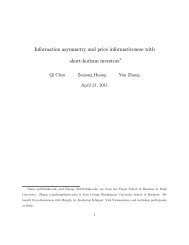Does Enforcement of Intellectual Property Rights Matter in China ...
Does Enforcement of Intellectual Property Rights Matter in China ...
Does Enforcement of Intellectual Property Rights Matter in China ...
Create successful ePaper yourself
Turn your PDF publications into a flip-book with our unique Google optimized e-Paper software.
<strong>Does</strong> <strong>Enforcement</strong> <strong>of</strong> <strong>Intellectual</strong> <strong>Property</strong> <strong>Rights</strong> <strong>Matter</strong> <strong>in</strong> Ch<strong>in</strong>a?<br />
Evidence from F<strong>in</strong>anc<strong>in</strong>g and Investment Choices <strong>in</strong> the High Tech Industry<br />
1. Introduction<br />
Allen, Qian and Qian (2005) raised the puzzle that “Ch<strong>in</strong>a’s legal and f<strong>in</strong>ancial systems as<br />
well as <strong>in</strong>stitutions are all underdeveloped, but its economy has been grow<strong>in</strong>g at a very fast rate.”<br />
More specifically, it is a challenge to expla<strong>in</strong> the high growth <strong>in</strong> R&D expenditure <strong>in</strong> Ch<strong>in</strong>a <strong>in</strong> spite<br />
<strong>of</strong> its generally perceived weak protection <strong>of</strong> <strong>in</strong>tellectual property (IP) rights. The growth <strong>of</strong> Ch<strong>in</strong>a’s<br />
R&D expenditure ranked first among 40 OECD (Organization for Economic Co-operation and<br />
Development) countries and selected non-member economies from 2002 to 2010, while its IP<br />
protection is still considered very weak <strong>in</strong> comparison to other countries (Israel, 2006; Stratford,<br />
2006; International <strong>Intellectual</strong> <strong>Property</strong> Association, 2007). 1 The Ch<strong>in</strong>a phenomenon has become<br />
such an anomaly, as some cross-country studies are unable to obta<strong>in</strong> the expected positive relation<br />
between IP protection and economic growth unless Ch<strong>in</strong>a is excluded from the sample (Gould and<br />
Gruben, 1996). <strong>Does</strong> this lead to the <strong>in</strong>ference that Ch<strong>in</strong>a is somehow different and IP protection<br />
does not matter there? That is the question we address <strong>in</strong> this paper.<br />
Effective protection <strong>of</strong> <strong>in</strong>tellectual property rights depends both on the existence <strong>of</strong> IP laws and<br />
the enforcement <strong>of</strong> the laws. 2<br />
Although much has been written about the IP rules and laws (e.g.,<br />
Gould and Gruben, 1996; Moser, 2005), there is little empirical evidence on the importance <strong>of</strong> their<br />
enforcement. One reason is that studies <strong>of</strong> IP protection are generally performed at the country<br />
1 We obta<strong>in</strong> the <strong>in</strong>formation from the OECD website, http://stats.oecd.org/Index.aspx and R&D Magaz<strong>in</strong>e:<br />
http://www.rdmag.com/.<br />
2 La Porta, Lopez-de-Silanes, Shleifer, and Vishny (1998) state that “a strong system <strong>of</strong> legal enforcement<br />
could substitute for weak rules” (p.1140). The cross-country studies <strong>of</strong> La Porta et al. (2006) and Jackson and<br />
Roe (2008) have documented the role <strong>of</strong> private and public enforcement <strong>of</strong> securities laws.<br />
3



